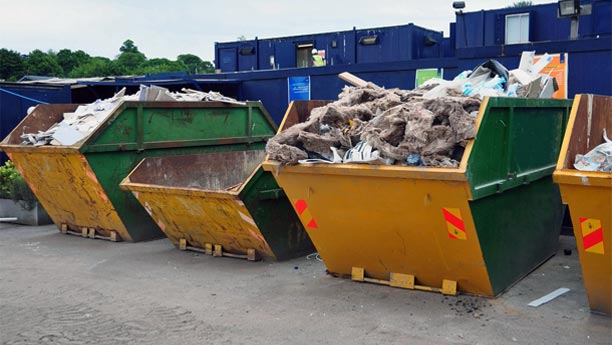Skip Bin Guide — Types, Sizes, Uses, and Safety
by Addison Rigg
Posted on 27-09-2023 05:09 PM

Skip bins, often overlooked but essential tools for waste management, play a pivotal role in keeping our environments clean and organised. Whether you're tackling a home renovation project, decluttering your space, or managing waste at a construction site, understanding the world of skip bins is crucial.
This comprehensive guide will delve into the different types of skip bins, their sizes, practical applications, and most importantly, safety precautions.
Types of Skip Bins
Skip bins come in various types, each tailored to specific needs and preferences. Here's a breakdown of the most common types:
1. Open Skip Bins
Open skip bins are a popular choice due to their traditional open-topped design, making them versatile and easy to load with various types of waste, from household garbage to construction debris.
However, one drawback of open skip bins is their vulnerability to weather exposure and pests, which can be a concern in certain situations.
2. Closed Skip Bins
Closed skip bins feature a cover or lid that provides weather protection and helps secure waste containment. This design is particularly suitable for disposing of sensitive or hazardous materials, ensuring that they remain protected and contained.
Additionally, closed skip bins prevent unauthorized access, adding an extra layer of security to your waste disposal needs.
3. Mobile Skip Bins
Mobile skip bins mounted on trailers offer a convenient solution. They are maneuverable and can fit into tight spaces, making them suitable for residential use. In some cases, they may not require council permits, simplifying the disposal process.
However, it's important to note that mobile skip bins have limited capacity compared to their stationary counterparts, so they may not be the best choice for large-scale waste disposal projects.
Skip Bin Sizes and Capacities
Skip bins are available in various sizes to accommodate different waste disposal needs. Understanding the right size is crucial to avoid overfilling or underutilising the bin. Here are some common skip bin sizes and their approximate capacities:
- Mini Skip Bin (2-3 cubic meters) — Suited for small-scale household projects. Ideal for spring cleaning and garden waste removal.
- Midi Skip Bin (4-6 cubic meters) — Perfect for medium-sized renovations. Suitable for kitchen or bathroom remodels.
- Maxi Skip Bin (8-12 cubic meters) — Suited for larger projects. Ideal for home renovations and construction sites.
- Industrial Skip Bin (12-30 cubic meters) — Reserved for heavy-duty construction sites. Suitable for industrial waste management.
When selecting the right skip bin size, consider the volume of waste you'll generate and the available space for bin placement.
Practical Uses of Skip Bins
Skip bins offer versatile solutions for managing waste in various scenarios:
1. Waste Disposal during Construction
During construction projects, they prove invaluable in efficiently handling the waste generated at construction sites. Whether it's collecting debris, packaging materials, or equipment discards, skip bins help ensure a clean and organized work environment, promoting safety and productivity.
2. Spring Cleaning
For residential purposes, skip bins are an ideal choice for spring cleaning endeavors. They provide a convenient means of decluttering and disposing of household waste, making it easier to tackle thorough home cleanups. From old furniture to unwanted belongings, skip bins simplify the process of getting rid of accumulated items.
3. Garden Waste Removal
In the realm of landscaping and garden maintenance, skip bins shine when it comes to green waste removal. They are perfect for disposing of branches, leaves, grass clippings, and other organic materials.
Whether you're working on a small garden project or a larger landscaping endeavor, skip bins are excellent tools for keeping your outdoor spaces clean and tidy.
4. Commercial Use
Businesses also benefit significantly from the use of skip bins, especially for office waste disposal. Skip bins are incredibly useful during commercial space renovations, allowing for efficient removal of construction debris and waste.
Moreover, they provide an ongoing solution for managing waste generated by day-to-day business operations, contributing to a clean and organized workplace.
5. Optimising Space
Skip bins can aid in optimizing space utilization. Breaking down large items before disposal helps save space within the bin, allowing for more efficient waste collection. Properly packing and distributing the weight evenly within the skip bin ensures safe and stable transportation.
Additionally, separating recyclables within the skip bin promotes recycling efforts, making it easier to divert materials away from landfills and towards more sustainable disposal methods.
Embracing Responsible Skip Bin Usage
Skip bins are indispensable tools for managing waste efficiently. Understanding the types, sizes, and safety precautions associated with skip bins empowers you to make informed decisions when tackling projects or disposing of waste.
Always prioritise safety, follow local regulations, and consider recycling to minimise your environmental impact. Responsible skip bin usage not only contributes to a cleaner environment but also enhances the overall quality of life in your residential area.
If you're in Perth and require skip bin services for your waste disposal needs, consider a reputable residential bin hire service. Together, we can ensure cleaner, safer, and more sustainable communities.
Take the first step towards responsible waste management and make a positive impact on your surroundings. It's time to put skip bins to work for you!